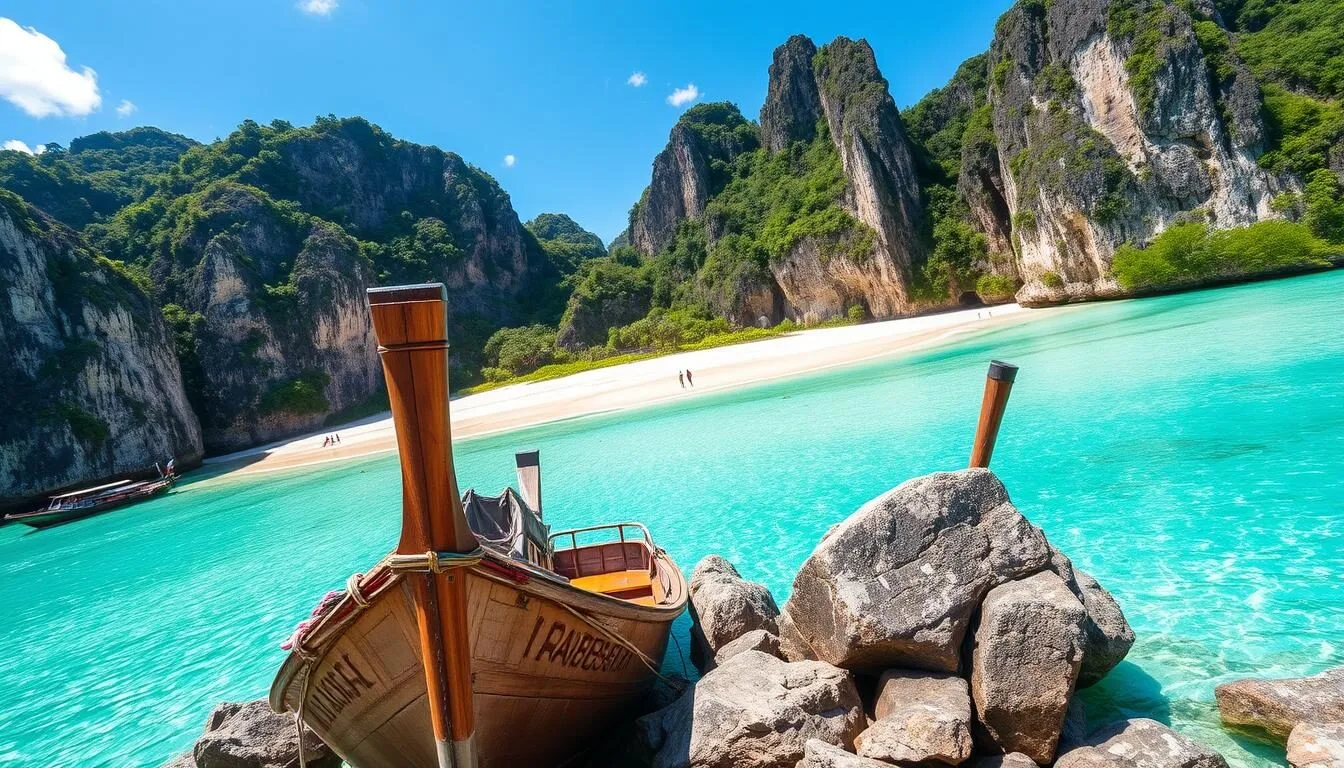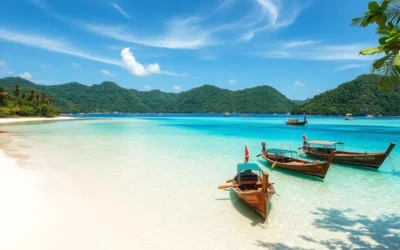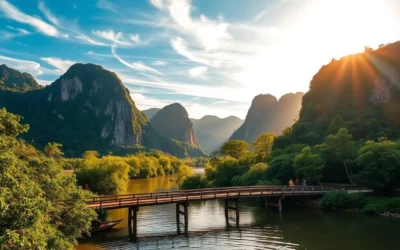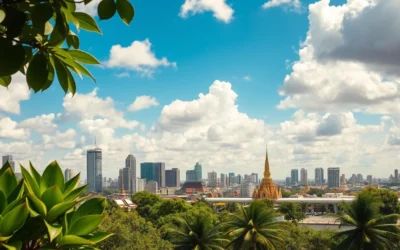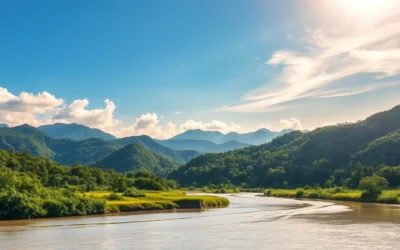The allure of Krabi, Thailand, lies in its pristine beaches and crystal-clear waters, making it a sought-after destination, yet the best time to visit is a crucial factor to consider for an optimal experience. Krabi’s weather patterns differ significantly throughout the year, with distinct dry, hot, and rainy seasons that each offer unique advantages and challenges for travelers.
Understanding Krabi’s Climate Cycles
To make the most of your trip to Krabi, it’s essential to understand the local climate cycles. The dry season, which typically runs from November to March, is considered the best time to visit Thailand, including Krabi. However, this period is also the peak tourist season, meaning higher prices for flights and accommodations.
Key Considerations for Visiting Krabi:
- Krabi’s stunning limestone cliffs, pristine beaches, and crystal-clear waters make it one of Thailand’s most sought-after destinations.
- Weather patterns in Krabi differ significantly throughout the year.
- This comprehensive guide will help you navigate Krabi’s climate cycles.
- You’ll discover why certain months offer the perfect balance of pleasant weather and reasonable prices.
Whether you’re planning to island-hop, rock climb, snorkel, or simply relax on the beach, understanding Krabi’s weather patterns will ensure you make the most of your Thai adventure. By choosing the right time to visit, you can enjoy your preferred activities while avoiding the crowds and high prices associated with the peak season.
With some advance planning, visitors can travel outside the dry season, save money on flights and hotel rooms, and still experience great weather. This guide will help you identify the best months to visit Krabi based on your preferences and budget.
Understanding Krabi’s Climate: A Year-Round Overview
Krabi, a stunning province on Thailand’s Andaman coast, boasts a unique climate that attracts visitors from around the world. Its geographical location plays a significant role in shaping its weather patterns.
Krabi’s Location on the Andaman Coast
Krabi is situated on the Andaman coast, an area that includes other popular destinations like Phuket, Koh Lanta, and Koh Phi Phi. This region’s climate is influenced by the Andaman Sea, which brings distinct weather patterns compared to the Gulf of Thailand. The Andaman coast is known for its beautiful islands and weather patterns that differ significantly from other parts of Thailand.

The Three Distinct Seasons in Krabi
Krabi experiences three main seasons: the dry season from November to April, the hot season from March to May, and the rainy season from May to October. Understanding these seasons is key to planning your trip. The dry season is considered the best time to visit Thailand, with pleasant weather and calm seas.
How Krabi’s Weather Differs from Other Thai Destinations
Krabi’s weather patterns are distinct from other Thai destinations due to its location on the Andaman coast. Unlike the Gulf of Thailand destinations like Koh Samui or Pattaya, Krabi experiences different monsoon timings. While Bangkok swelters in heat from March to May, Krabi benefits from moderating sea breezes. The rainfall in Krabi also differs from northern destinations like Chiang Mai, which experience a cool season from November to February.
| Destination | Best Time to Visit | Weather Characteristics |
|---|---|---|
| Krabi | December to February | Cool and dry |
| Koh Samui | January to April | Warm and sunny |
| Chiang Mai | November to February | Cool and dry |
The Dry Season in Krabi: November to April
Krabi’s dry season, spanning from November to April, is a period of idyllic weather and bustling tourist activity. This time frame is considered the best time to visit Krabi, offering a unique blend of pleasant weather and vibrant tourist life.
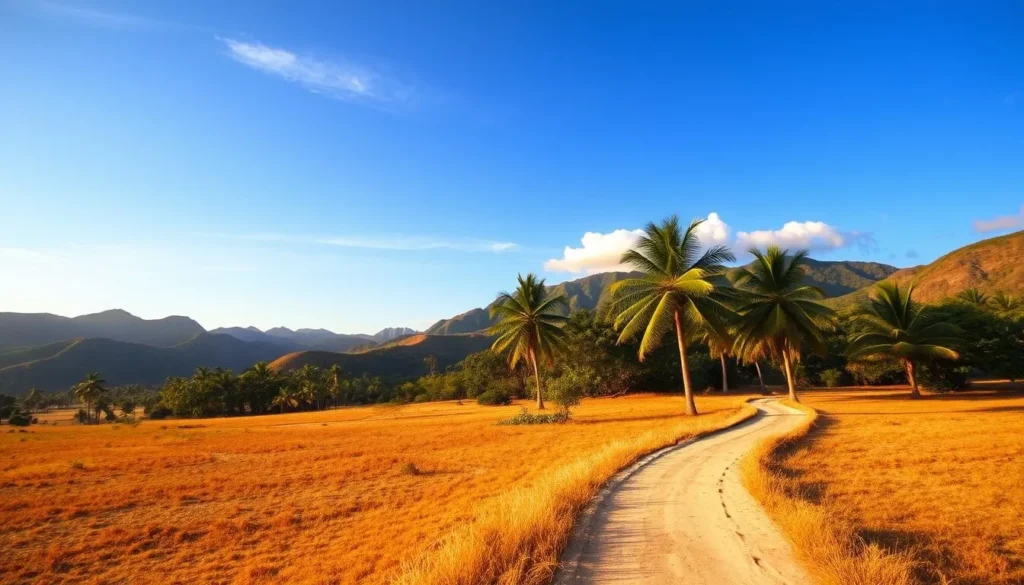
Temperature and Rainfall Patterns
During the dry season, Krabi experiences minimal rainfall, with average temperatures ranging from 25°C to 30°C (77°F to 86°F). This period is characterized by dry and sunny weather, making it ideal for outdoor activities and beach visits. You can expect a gentle breeze, especially in the mornings and evenings, adding to the comfort of your visit.
Sea Conditions and Water Visibility
The sea conditions during the dry season are generally calm and clear, with excellent water visibility. This makes it an excellent time for snorkeling, diving, and other water activities. The Andaman Sea’s waters are typically turquoise, offering breathtaking views and an opportunity to explore the rich marine life.
Tourist Crowds and Accommodation Prices
The dry season coincides with Krabi’s peak tourist season, with December and January being the busiest months. As a result, tourists can expect larger crowds and higher prices for accommodations. Booking your stay well in advance is crucial, especially for premium properties. You can expect prices to increase by 30-50% during this peak period compared to the rainy months.
However, visiting in November or early December can be a strategic move, as the dry weather sets in, and the crowds are still relatively manageable. This period offers a sweet spot for travelers looking to enjoy good weather without the peak season prices.
Peak Season: December to February in Krabi
December to February marks the peak tourist season in Krabi, attracting visitors from around the world with its cool and dry weather. This period is ideal for enjoying the region’s stunning beaches and outdoor activities.
Weather Highlights During the Coolest Months
The weather during December, January, and February is characterized by cooler temperatures and lower humidity, making it the best time to visit Krabi. Average temperatures range from 25°C to 30°C (77°F to 86°F), creating perfect conditions for beach activities and island hopping.
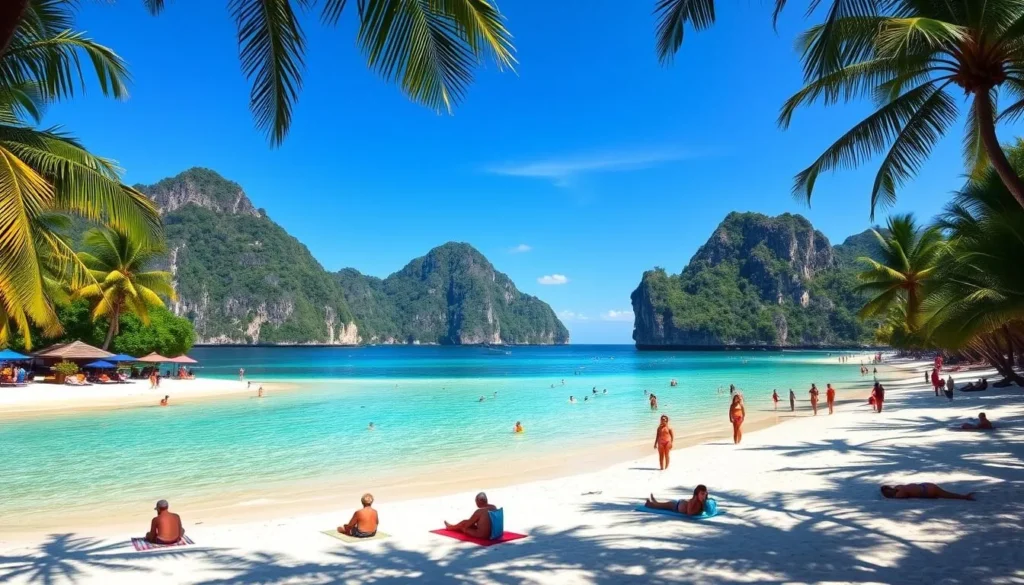
Best Outdoor Activities During Peak Season
During the peak season, Krabi offers a wide range of outdoor activities. You can enjoy snorkeling, diving, and boat tours to explore the islands, such as Phi Phi and the Four Islands. The calm seas and clear waters make it an ideal time for water sports and activities.
| Activity | Location | Best Time |
|---|---|---|
| Snorkeling | Phi Phi Islands | December to February |
| Diving | Railay Beach | January to February |
| Island Hopping | Four Islands | December to February |
Holiday Season Considerations for Travelers
As the peak season coincides with the holiday period, travelers should be prepared for larger crowds and higher prices. Popular beaches like Ao Nang and Railay can get crowded, and restaurants may require reservations. It’s advisable to book your accommodations and tours well in advance to avoid higher costs and availability issues.
Despite the crowds and higher prices, the peak season offers a vibrant atmosphere with special events and festivities, making it a great time to visit Krabi. You can enjoy the festive atmosphere, beach parties, and spectacular fireworks displays on New Year’s Eve.
Shoulder Season: November and April in Krabi
The shoulder season in Krabi, spanning November and April, presents an attractive option for those seeking favorable conditions without the peak season rush. This period offers a blend of pleasant weather and exciting activities, making it an ideal time to visit.
November: Beginning of the Dry Season
November marks the beginning of the dry season in Krabi, characterized by decreasing rainfall and rising temperatures. As the month progresses, the weather becomes more settled, with plenty of sunshine and calm seas. This makes November an excellent time for water activities such as snorkeling and diving, as the visibility is generally good.
Key Highlights of November:
- Comfortable temperatures, ranging from 25-30°C (77-86°F)
- Decreasing rainfall, leading to clearer skies
- Ideal conditions for water sports and island hopping
April: Transition to Hot Season and Songkran Festival
April represents the transition from the dry season to the hot season in Krabi, with temperatures climbing to their yearly peak, often reaching 34-36°C (93-97°F) during the daytime. Despite the increasing heat, April still offers predominantly dry weather with clear skies, though you might experience occasional pre-monsoon showers.
The highlight of April is the Songkran festival, celebrated from April 13-15, where locals and tourists participate in friendly water fights throughout Krabi Town and Ao Nang—a refreshing way to cool off in the escalating heat.
| Activity | November | April |
|---|---|---|
| Weather | Comfortable temperatures, decreasing rainfall | Hot and humid, occasional pre-monsoon showers |
| Water Activities | Ideal for snorkeling, diving, and island hopping | Calm seas, excellent visibility for snorkeling and diving |
| Festivals | No major festivals | Songkran Festival (April 13-15) |
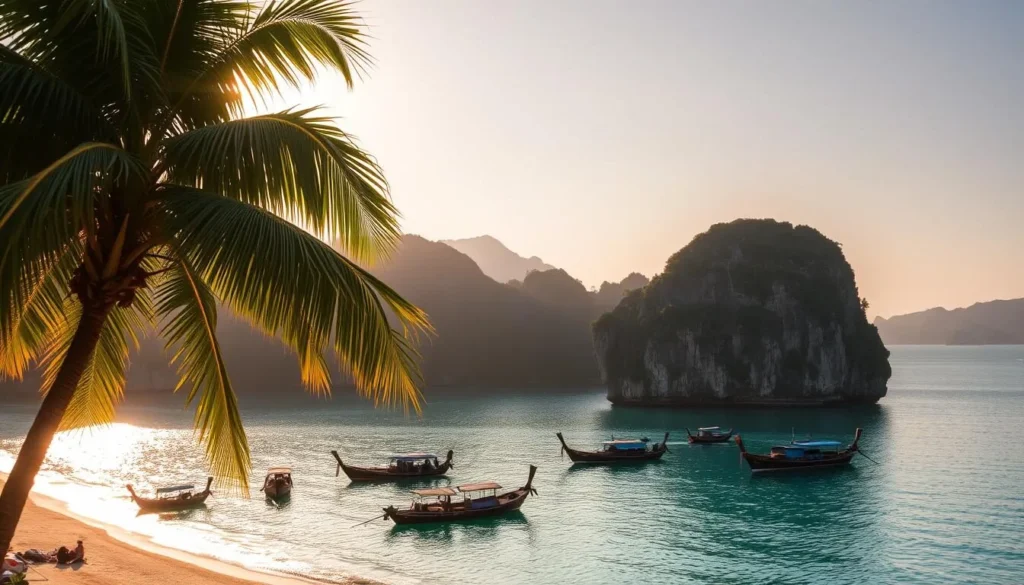
Krabi, Thailand: Best Months for a Weather-Savvy Trip
For a truly unforgettable experience in Krabi, Thailand, knowing the best months to plan your visit is essential. The best time to visit Thailand generally falls within the cool and dry season, which is from November to February. During this period, the weather is pleasant, with lower humidity and comfortable temperatures, making it ideal for exploring both the cities and the beaches.
Top Three Months for Beach Activities
The top three months for beach activities in Krabi are December, January, and February. These months offer the most favorable weather conditions, with calm seas and clear skies. You can enjoy a variety of beach activities such as swimming, sunbathing, and snorkeling. The sea conditions are perfect for water sports, and the weather is generally sunny, making it ideal for a beach vacation.
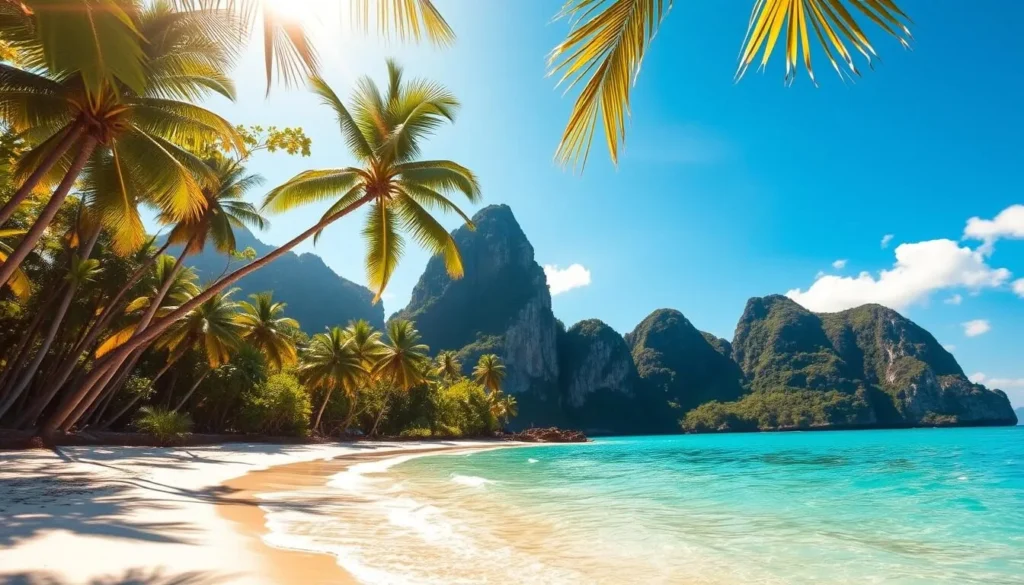
Best Months for Outdoor Adventures and Island Hopping
For outdoor adventures and island hopping, the best months are November, January, and April. November marks the beginning of the dry season, offering lush landscapes and clear waters. January provides the clearest atmospheric conditions, ideal for island hopping and exploring Krabi’s iconic limestone formations. April, while transitioning to the hot season, still offers favorable conditions for outdoor activities before the onset of the rainy season.
Ideal Timing for Photography and Sightseeing
The ideal timing for photography and sightseeing in Krabi is during the dry season, particularly in November and December. These months offer the most photogenic conditions, with clear skies and landscapes that remain lush and vibrant from the recent rainy season. January is also excellent for landscape photography due to its clear atmospheric conditions. For cultural photography, April’s Songkran Festival provides unique opportunities to capture colorful celebrations.
The Hot Season: March to May in Krabi
March to May marks the hot season in Krabi, a period characterized by rising temperatures and exciting cultural events. As the dry season comes to a close, the temperatures begin to spike, and the humidity levels increase, creating a hot and sometimes humid climate.
Temperature Spikes and Humidity Levels
During the hot season, Krabi experiences significant temperature rises, often reaching highs of around 35°C (95°F). The humidity levels also increase, making the heat feel more intense. However, the dry weather continues until late May, allowing for plenty of sunshine and outdoor activities.
Water Activities During the Hottest Months
Despite the heat, the sea conditions remain favorable for water activities such as snorkeling, diving, and boat trips to the islands. The warm waters are perfect for exploring the underwater world, and the calm seas make it an ideal time for island hopping.
Benefits of Visiting During the Hot Season
Visiting Krabi during the hot season has its advantages. You can enjoy lower accommodation rates, fewer crowds at popular attractions, and the unique experience of the Songkran (Thai New Year) festival in April. Additionally, tour operators often offer promotional rates, making it a more affordable time to enjoy premium experiences.
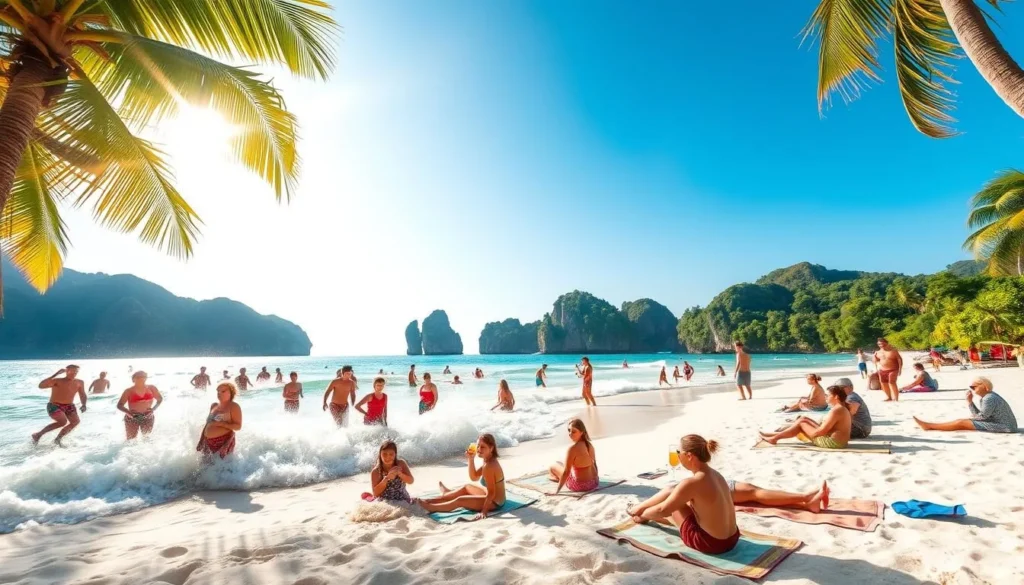
| Benefits | Description |
|---|---|
| Lower Accommodation Rates | Prices drop by 20-30% after the European winter holiday period ends |
| Fewer Crowds | Popular attractions become less crowded, allowing for more peaceful experiences |
| Songkran Festival | Experience Thailand’s most famous festival with water fights and cultural ceremonies |
| Promotional Rates | Tour operators offer discounts to attract customers during this period |
The Rainy Season: May to October in Krabi
Krabi’s landscape transforms during the rainy season, from May to October, making it an interesting time to visit for some travelers. While the rain may deter some, it brings numerous benefits and unique experiences.
Monsoon Patterns and Rainfall Statistics
The rainy season in Krabi is characterized by the southwest monsoon, which brings significant rainfall to the region. On average, Krabi receives a substantial amount of rain during these months, with September typically being the wettest.
Key rainfall statistics:
- Average rainfall: 200-300 mm per month
- Number of rainy days: 15-20 days per month
- Most rainfall occurs in the late afternoon and evening
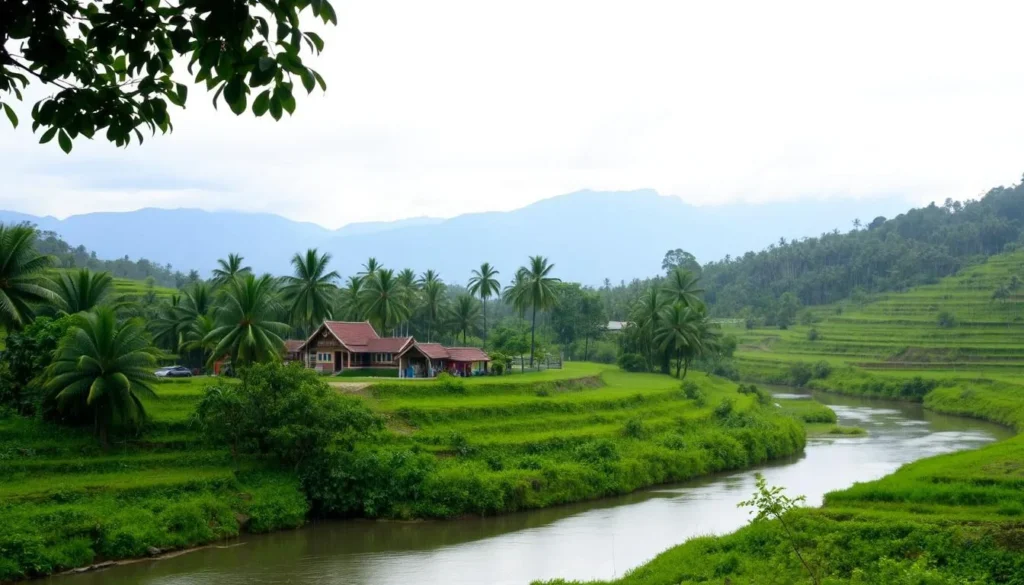
Green Season Benefits: Lush Landscapes and Fewer Tourists
The rainy season turns Krabi into a lush, green paradise. The rain nourishes the vegetation, making the landscapes more vibrant and beautiful. Additionally, the number of tourists decreases significantly, providing a more peaceful and serene atmosphere.
The Green Season offers a unique opportunity to enjoy Krabi’s natural beauty without the crowds. You can explore the islands, beaches, and national parks without the hustle and bustle of peak season.
Activities Still Enjoyable During the Rainy Season
Despite the rain, many activities remain enjoyable in Krabi during the rainy season. You can plan your days according to the weather, taking advantage of the morning hours when rain is less likely.
- Cultural experiences like Thai cooking classes and traditional massage
- Visiting the Emerald Pool and Hot Springs, which are enhanced by the rain
- Indoor activities like shopping at Krabi Town’s walking street market or exploring the Shell Cemetery
- Enjoying spa treatments or relaxing at your resort
Even during the rainy season, Krabi typically experiences several completely dry days each week, especially in the transitional months of May, June, and October. This allows for beach time and outdoor exploration with some flexibility in your schedule.
Month-by-Month Weather Guide for Krabi
Planning a trip to Krabi requires a good understanding of its monthly weather patterns. This guide will help you navigate the best times to visit based on the weather.
January to April: Dry Season Details
From January to April, Krabi experiences its dry season, characterized by pleasant temperatures and minimal rainfall. January and February are the coolest months, with average temperatures ranging from 24-31°C (75-88°F), making them ideal for outdoor activities. As the season progresses, temperatures gradually rise, but the dry conditions persist, making it a great time for beach activities and island hopping.
Sea conditions are particularly favorable during these months, with calm and clear waters perfect for snorkeling and diving. With plenty of sunshine, the dry season is an excellent time to enjoy Krabi’s beautiful beaches.
May to August: Early to Mid Rainy Season
As Krabi transitions into the rainy season from May to August, the weather becomes more unpredictable. May marks the beginning of the monsoon season, with increasing rainfall and humidity. June and July are typically the wettest months, with frequent rain showers and occasional heavy downpours. Despite the rain, the lush green landscapes and fewer tourists can make it an attractive time for those looking for a more serene experience.
The rain showers are often followed by sunshine, and the temperatures remain warm, averaging around 25-32°C (77-90°F). While some water activities might be affected by the rain, jungle treks and exploring Krabi’s interior can be particularly rewarding during this time.
September to December: Late Rainy Season to Early Dry Season
September is usually the peak of the rainy season, with high rainfall and rough seas. However, by October, there’s often a slight improvement in the weather, with decreasing rainfall as the month progresses. November marks a significant transition towards the dry season, with a substantial decrease in rainfall and increasing sunshine.
By December, Krabi is fully back into its dry season, with pleasant temperatures, low humidity, and calm seas. This period is ideal for visiting Krabi’s famous beaches and enjoying water activities. The improving sea conditions and clearer skies make it an excellent time for photography and sightseeing.

Planning Tips for Different Weather Conditions in Krabi
To make the most of your Krabi trip, it’s essential to be prepared for the varying weather conditions throughout the year. Whether you’re visiting during the dry season or the monsoon months, being informed will help you pack appropriately and make the most of your time in this beautiful Thai province.
What to Pack Based on When You Visit
Packing for Krabi depends largely on the time of year you visit. During the dry season, from November to April, lightweight clothing and sun protection are essential. In contrast, the monsoon season, which runs from May to October, requires rain gear and waterproof bags to keep your belongings dry.
| Season | Weather Conditions | Packing Essentials |
|---|---|---|
| Dry Season (Nov-Apr) | Sunny, dry | Lightweight clothing, sun protection |
| Monsoon Season (May-Oct) | Rainy, humid | Rain gear, waterproof bags |
Booking Strategies for Different Seasons
Booking your accommodations and tours in Krabi should be done with the season in mind. During peak season (December to February), it’s advisable to book well in advance to secure the best deals and avoid sold-out situations. In contrast, during the shoulder season (November and April), you may find better value for money and fewer crowds.
- Peak Season (Dec-Feb): Book early to secure best deals
- Shoulder Season (Nov, Apr): Look for value for money and fewer crowds
- Monsoon Season (May-Oct): Consider budget-friendly options and potential discounts
Weather-Related Travel Insurance Considerations
Travel insurance becomes particularly important when visiting Krabi, especially during the rainy season. Look for policies that cover weather-related cancellations and delays, as well as water-based activities if you plan to engage in snorkeling, diving, or boat tours. Ensure your policy includes coverage for natural disasters like flooding, which can occasionally affect coastal areas of Krabi.
Conclusion: Making the Most of Your Krabi Trip Whatever the Weather
Understanding Krabi’s climate is key to enjoying this beautiful Thai province to its fullest potential. The best time to visit Krabi depends on your preferences and what you want to do.
While November through April offers the most reliable weather, each season presents unique opportunities. The dry season is perfect for beach activities and island hopping, though it’s peak tourist season. The hot season brings intense heat but also the chance to experience Songkran, Thailand’s famous festival.
The rainy season transforms Krabi into a lush, green paradise with fewer tourists and lower prices, making it ideal for travelers on a budget or those seeking a more authentic experience.
Regardless of when you visit, Krabi’s stunning limestone karsts, beautiful beaches, and warm Thai hospitality remain constant. By aligning your expectations and activities with the season, you can have a memorable trip to Krabi. With proper planning, you can make the most of your time visiting this incredible destination, enjoying its attractions and activities throughout the year.
—
The above is subject to change.
Check back often to TRAVEL.COM for the latest travel tips and deals.
